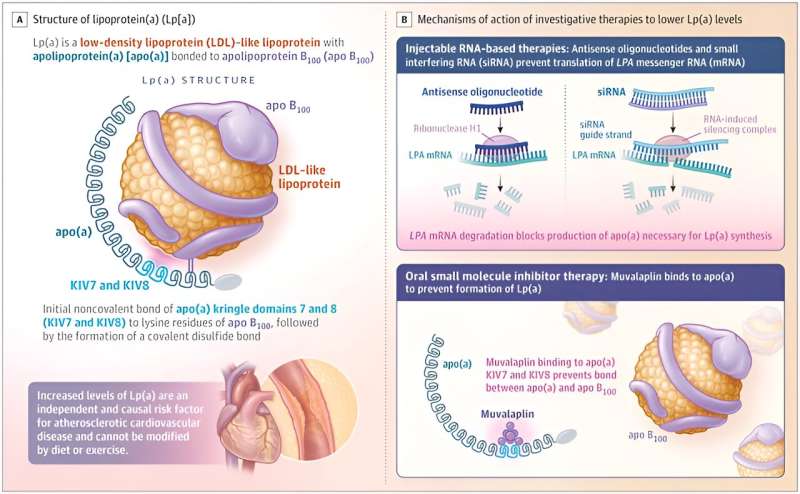This article has been reviewed according to Science X's editorial process and policies. Editors have highlighted the following attributes while ensuring the content's credibility:
fact-checked
peer-reviewed publication
trusted source
proofread
Novel drugs targets form of previously untreatable life-threatening 'bad cholesterol'

A new drug offers a breakthrough world first treatment for Lipoprotein(a), a largely genetic form of cholesterol that increases the risk of heart attack and stroke, announced today by study lead Professor Stephen Nicholls, Director of the Monash University's Victorian Heart Institute and Victorian Heart Hospital.
High levels of Lipoprotein(a), known as Lp(a) or spoken as "LP little a," impact one in five people globally with no approved treatment currently on the market.
The trial demonstrated the success of Muvalaplin—the first oral drug ever developed to target Lp(a)—effectively lowering levels by up to 65%. It works by disrupting the ability for Lp(a) to form in the body.
Professor Stephen Nicholls, cardiologist and Director of Monash University's Victorian Heart Institute and the Victorian Heart Hospital at Monash Health, led the landmark research and trial, presented at the European Society of Cardiology Congress in Amsterdam today and published in JAMA.
Lp(a) is similar to LDL cholesterol, sometimes called 'bad cholesterol,' but is more sticky, increasing risk of blockages and blood clots in arteries.
Common LDL lowering drugs such as statins don't have the same lowering effect on Lp(a). Being largely genetic, Lp(a) is also difficult to control through diet, exercise and other lifestyle changes.
Although Lp(a) was discovered nearly 60 years ago there still aren't any widely accessible treatments available to lower levels and reduce cardiovascular risk.
Professor Nicholls said the global research industry has been working on a targeted solution to treat elevated Lp(a) for the past decade, but advancements so far have been in difficult to administer injection-based therapies that are not yet on the market.
"When it comes to treating high Lp(a), a known risk factor for cardiovascular disease, our clinicians currently have no effective tools in their kit," Professor Nicholls said.
"This drug is a gamechanger in more ways than one. Not only do we have an option for lowering an elusive form of cholesterol, but being able to deliver it in an oral tablet means it will be more accessible for patients."
"Lp(a) is essentially a silent killer with no available treatment, this drug changes that."
More information: Stephen J. Nicholls et al, Muvalaplin, an Oral Small Molecule Inhibitor of Lipoprotein(a) Formation, JAMA (2023). DOI: 10.1001/jama.2023.16503



















